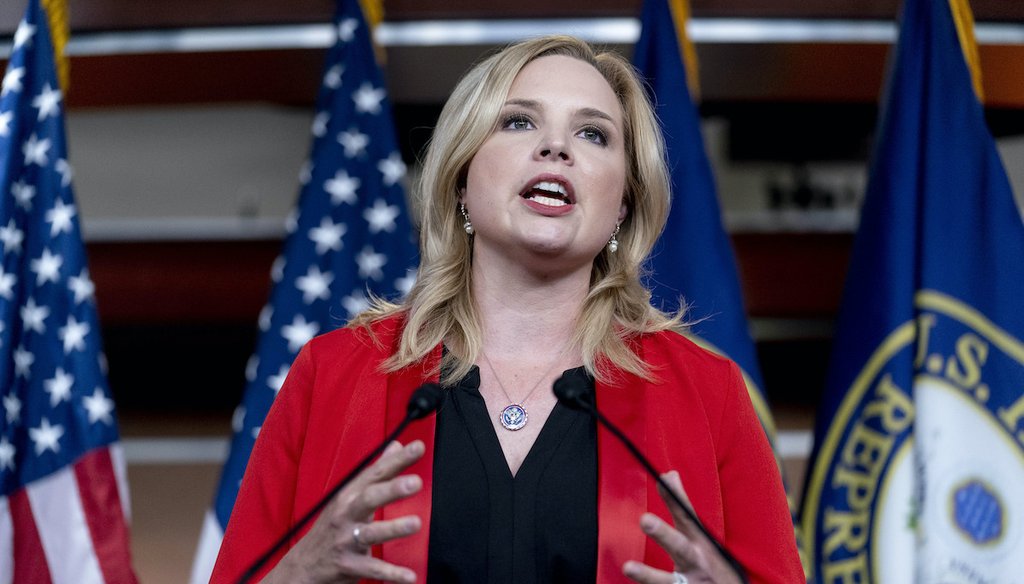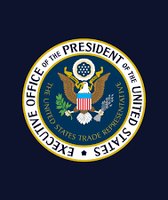Get PolitiFact in your inbox.

Rep. Ashley Hinson, R-Iowa, speaks at a news conference on Capitol Hill in Washington, Tuesday, June 15, 2021. (AP)
If Your Time is short
- Republican members of Iowa’s delegation have repeatedly claimed the $1.75 trillion reconciliation plan Democrats are negotiating will raise taxes on a vast swath of taxpayers.
- Democrats have repeatedly said tax increases in the bill are aimed at those making more than $400,000 and large corporations.
- A report from Congress’ Joint Committee on Taxation showed potential future increases for middle and working class people, but not as a direct result of the Build Back Better plan.
As Democrats continue to debate what should be included in the Build Back Better plan, Republican members of Iowa’s delegation repeatedly have claimed that the $1.75 trillion social spending bill — $1.85 trillion if the Senate approves a $100 million provision for new rules for undocumented immigrants — will come at the expense of working and middle class taxpayers and small businesses.
Sen. Joni Ernst and Reps. Mariannette Miller-Meeks, Randy Feenstra and Ashley Hinson have all made statements predicting the Build Back Better Act, on hold while the Congressional Budget Office produces a cost estimate for the plan, will impact American taxpayers negatively.
Hinson has said on multiple occasions that Democrats plan to tax everyone.
"While we are still reviewing the full details, it is clear this will increase taxes on working families and small businesses, while driving up prices even higher for working families," Hinson said in a press release in response to Democrats releasing the text of H.R. 5376, also known as the Build Back Better Act.
PolitiFact looked into whose taxes would be impacted under the proposed bill.
Sign up for PolitiFact texts
The House Ways and Means Committee describes the tax increases on high income individuals as increasing the tax rate to 39.6% for married individuals filing jointly with taxable income over $450,000, heads of households with taxable income over $425,000, unmarried individuals with taxable income over $400,000, married individuals filing separate returns with taxable income over $225,000, and estates and trusts with taxable income over $12,500.
On the Senate side, the budget proposal prohibits raising taxes on those making less than $400,000.
Sophie Seid, Hinson’s communications director, shared a Joint Committee on Taxation report that shows decreases in taxation in 2023 and 2025 for those making $50,000, but then increases after 2025, when Trump-era tax codes expire.
According to a fact sheet from the White House, a new Treasury Department analysis shows that the proposal wouldn’t increase income tax rates on 97% of small business owners and would provide tax cuts to more than 3.9 million entrepreneurs. The sheet says the plan would raise the corporate income tax rate to 28% and enact a 15% minimum tax on large book income of large and highly profitable corporations. Book income is the amount corporations publicly report on their financial statements to shareholders.
PolitiFact has reported previously that the majority of tax dollars would come from wealthy families and corporations. The corporate tax increases would create some burden on those making less than $400,000, as corporations may respond to increased taxing with lower wages for workers and lower investment returns for people in all income levels.
Biden has claimed that the reconciliation plan will pay for everything it spends, which PolitiFact previously has determined is too early to rule given unknown costs and revenues.
PolitiFact also has reported that Democrats are not yet required to keep the tax rate the same for those making less than $400,000, but Marc Goldwein, senior vice president at the Committee for a Responsible Federal Budget, said the intent is to raise taxes on people who meet that threshold, and corporations.
A Moody’s Analytics report issued Nov. 4 states that an infrastructure bill that received final House approval on Friday, Nov. 5, and the Build Back Better bill are necessary to address infrastructure needs, social issues and climate change, and will infuse money into jobs growth and productivity. "Passage of legislation remains uncertain, but failing to pass legislation would certainly diminish the economy’s prospects," the report, prepared by Moody’s Analytics’ chief economist, Mark Zandi, and Moody’s assistant director Bernard Yaros, states.
Ratings and definitions
Iowa’s Republicans in the U.S. House have made repeated claims about the reconciliation bill’s tax plan, with Hinson, for example, saying Democrats want to "increase taxes on working families and small businesses" and "tax everyone."
While there could be some costs to middle and working class families, the tax increases in proposed reconciliation bills have been aimed at people making more than $400,000 large corporations. Those making could see a tax increase when tax rates enacted during the Trump Administration are to expire in 2025.
Without a final reconciliation bill passed, and with PolitiFact’s previous ruling that it’s too early to know the costs of the bill, it is difficult to determine the final financial impact. However, the tax breaks in the bill have been aimed only at those earning more than $400,000.
We must wait, though, before rating the Iowa Republican congressional delegation statements. PolitiFact has refrained from rating statements like those made by Republicans and Democrats while the financial impact of the Build Back Better reconciliation bill is being determined.
Our Sources
Joni Ernst tweet, Aug. 23, 2021
Randy Feenstra tweet, Oct. 18, 2021
Mariannette Miller-Meeks tweet, Aug. 24, 2021
Newsmax, "Rep. Hinson to Newsmax: Dems Wanted Combined Spending Bills All Along," Oct. 5, 2021
The Iowa Torch, "Hinson Blasts $3.5 Trillion Reconciliation Budget Bill," by Shane Vander Hart, Sept. 3, 2021
Hinson press release, Oct. 28, 2021
H.R. 5376, Build Back Better Act, Oct. 28, 2021
House Ways and Means, Responsibly Funding Our Priorities
Roll Call; "House votes Friday on infrastructure, budget bill rule in doubt;" by Jessica Wehrman, Suzanne Monyak and Joseph Morton; Nov. 5, 2021
Associated Press, "Dems end deadlock, House hands Biden infrastructure win," by Alan Fram, Nov. 6, 2021
Associated Press, "Paid leave, immigration, tax changes added to Biden bill;" by Lisa Mascaro, Mary Clare Jalonick and Farnousch Amiri; Nov. 3, 2021
Moody’s Analytics, "Macroeconomic Consequences of the Infrastructure Investment and Jobs Act & Build Back Better Framework," by Mark Zandi and Bernard Yaros, Nov. 4, 2021
CNBC, "Democrats’ budget prohibits higher taxes for those making less than $400,000. Here’s who might pay more," July 15, 2021
The White House, FACT SHEET: The Build Back Better Agenda Will Provide Greater Tax Fairness for Small Businesses, Aug. 19, 2021
The Joint Committee on Taxation, "Description Of The Chairman’s Amendment In The Nature Of A Substitute To The Committee Print Relating To Infrastructure Financing (Subtitle F), Green Energy (Subtitle G), The Social Safety Net (Subtitle H), And Prescription Drug Pricing (Subtitle J)," Sept. 13, 2021; and "Estimated Budget Effects Of The Revenue Provisions Of Title XIII – Committee On Ways And Means, Of H.R. 5376, The "Build Back Better Act," As Reported By The Committee On The Budget, With Modifications (Rules Committee Print 117-18)," Nov. 4, 2021
PolitiFact, "Can Joe Biden’s agenda really cost zero dollars? A guide to the bills and the numbers," Sept. 29, 2021
PolitiFact, "What a GOP ad omits about Democrats’ spending proposal," Oct. 21, 2021
The Washington Post, "Kevin McCarthy’s claim that Biden’s plan will raise taxes on families making over $50,000," by Glenn Kessler, Oct. 4, 2021



































